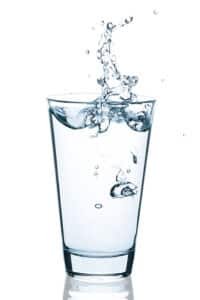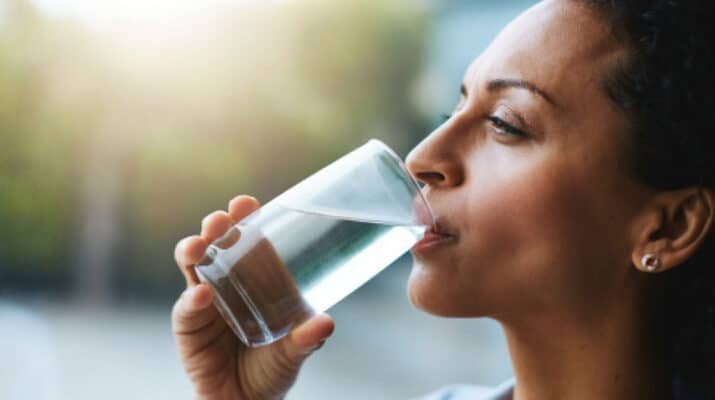Most of your body is water, after all
By Deborah Jeanne Sergeant
 About 60% of the average person’s body is water. That makes it pretty important for health to stay hydrated.
About 60% of the average person’s body is water. That makes it pretty important for health to stay hydrated.
“The human body does not have the ability to store water, so it must be replaced throughout the day, every day,” said Kimberly Higgins, registered dietitian and nutritionist and owner of Kimberly Higgins Food & Nutrition in Syracuse. “Water is needed to maintain cell structure, blood volume, regulate body temperature and lubricate and protect tissues. Even mild dehydration can produce symptoms like fatigue, light headedness and even hunger. Dehydration can also contribute to brain fog, muscle cramps and decreased athletic performance.”
Higgins encourages patients to carry along a large water bottle to better track their fluid intake.
“If you wear a smart watch that reminds you to stand each hour, use this opportunity to also drink four to eight ounces of water or other fluids,” she said.
She added that as another helpful habit, drinking a glass of water between each meal can increase hydration. Higgins suggests starting the day with a large glass of water, as people typically wake up mildly dehydrated.
How much water you need daily can vary. Factors that Higgins noted include: exercise, illness, weather conditions including both hot and cold temperature or low humidity, air travel, high altitudes, certain medications and life-stages like pregnancy and breastfeeding.
As a general rule for hydration, Laurel Sterling, registered dietitian with Carlson Labs in Canastota, quoted the US National Academies of Sciences, Engineering and Medicine, which states “an adequate daily fluid intake is about 15.5 cups of fluids a day for men and about 11.5 cups of fluids a day for women,” she said. “They stated that the fluid you consume doesn’t all need to come out of a glass because about 20% of your daily fluid intake can come from water that’s in food.”
Using the most appropriate vessel can make a difference. A flip-top insulated travel mug can help keep beverages cold longer while on the go. Some people prefer a lidded mug with a straw or a coffee mug with a fun logo. The key is choosing what will keep a beverage with you at all times.
It’s easy to become bored with water. For this problem, add a splash of fruit juice, cucumber slices, mint or other produce to add flavor. Infuser pitchers can help make this easier, as they keep the items from floating in the pitcher while still adding flavor.
Sparkling water that has no sweetener added can help hydrate. But it’s OK for people who truly struggle to hydrate to drink something sweetened, as that is better than dehydrating.
Caregivers can sneak in hydration to their elder’s diet through moisture-rich foods such as produce. Grapes, watermelon, oranges, celery, lettuce, cucumbers and melons are good examples. Smoothies, soups and stews can also increase hydration.
Don’t just wait until you feel thirsty to get a drink. If you become dehydrated, you may look into iv infusion therapy such as IV therapy in New Albany, IN.
“By the time you feel thirsty, you are already dehydrated,” said Julie Mellen registered dietitian nutritionist at Upstate Medical University. “The best indicator of being well hydrated is your urine color. It should be a pale yellow. Darker urine is a sign that you need to increase your fluids.”
She advises keeping a drink always available, such as refillable water bottles or a pitcher in the refrigerator containing the amount you need to consumer each day.
“Try to finish it before the day ends,” Mellen said.

